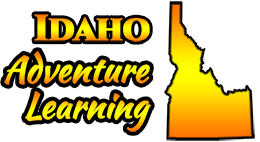Final Exam
Submitted by Jay Millan on Mon, 2017-06-19 00:00
Pocatello MILES Adventure Learning- Professional Development Workshop Final Assignment
Planning for integrating Social-Ecological Systems and Ecosystem Services concepts into your courses during the School Year 2017-2018. If you are an administrator, be creative and describe how you will help your AL teachers implement their plan!
WHO?
Teacher: Jason Millan
School: Snake River High School
Students: 9-12 grade Social Studies; Intro to American History tenth grade, US History A eleventh grade, US History B eleventh grade, World History 9-12 grade, US Military History 9-12 grade
WHAT? Describe some of the key MILES-related ideas, concepts, or learning objectives that you plan to integrate into your classes.
After taking the online version of the class (which honestly was not exactly what I hoped for and regret not being accepted into the actual workshop) I recognize that this was absolutely geared primarily for Science classes and Science teachers, while I am a secondary Social Studies teacher at Snake River High School, a rural school outside of Blackfoot. We are a mid-size agricultural district of about 650 students in the high school. My principal duties there consist of mostly instructing state required sophomore and junior American History courses but also World History and US Military History that are Social Science electives open for any student 9-12. With much of this course focusing on water systems, water cycles, biology and Ecosystem Services, one might question how this relates to my subject area at all.
Oddly enough, these topics do/can relate to my instructional units. I would first like to express my own background and how the western society is so radically different. Growing up in New York, gives me a radically different perspective on environmental issues than the Idaho students I interact with. Environmental concerns, especially water issues is a huge deal where I grew up and still spend my summers and this continues to impact my adult lifestyle. I consider myself to be a fairly moderate environmentalist although I don't lean left or absolutely believe in Climate Change. Recycling is the law in New York and in Idaho, almost nobody does it. Vehicle emissions are checked every year in New York and yet in Idaho, everyone wants to"roll coal." This differeng mind-sets on envrionmental issues is rather difficult for me to tolerate.
Water is a major environmental, political, economic, agricultural and societal concern in both regions as well as around the globe. In New York (at least upstate where I am from) water conservation is a massive concern. Agriculture and tourism are two of the biggest factors contributing to the region's economies. Very similar to southeastern Idaho where agriculture is the driving force. In the Finger Lakes Region of Upstate New York; dairy farming ,, family farms, fishing and eco-tourism (especially in the fall) are all pivotal factors in the state's economy all dependent upon water. In Idaho, especially the Blackfoot area, farming potatoes, beets and grains dive the economy in the high desert plateau and it too is dependent upon water.
Water concerns and conservation is taken much more seriously in New York than it is in Idaho and that is despite the fact that it is a much more abundant resource there than in Idaho. In my classes, we start every class period with current event discussions and environmental issues is a very common and reoccurring theme. The students in Idaho seem to believe that water is an unlimited resource. They do not seem tocomprehend that our entire region is dependent upon water, snow melt, rivers, reservoirs and the Snake River Aquifer and thoseare all finite resources. When I urge students to be more environmentally conscious especially when it comes to water, I am met with resistance and jeers of being a "hippie tree-hugger." If they only realized that a serious draught or a less than normal snow pack could cause an emptying of the aquafer and economic death and desertion of theentire Snake River Valley.
I always try to impart in my students some type of environmental awareness. I press them not to waste or to pollute our water. To impart upon them that farmers need the water first and foremost. To caution them against unregulated development coupled with unbridled population growth. I tell them that potable water is a valuable global commodity around the world and that anytime it could become even more valuable in Idaho. Wars are waged over water and Idaho youth just don't appreciate that.
WHEN? During which curriculum units do these best fit? What is the approximate time of the year that this would occur?
I squeeze water issues in to my historical discussions quite often. As far as it becoming a formal unit in my curriculum, I don't specifically believe that it would fit.
HOW? can the MILES project help? Be specific about your needs. You can request class visits by people you met (researchers and others) or expertise (e.g. I need a fisheries biologist or a geologist, or a political scientist...), equipment (probeware, ipads, etc.), field trip funds (some conditions apply for these), print or digital resources (maps, articles, lesson plans, links to websites, etc.).
The MILES Project could probably assist my class with maps of the Snake River Aquifer, charts on water usage, historical resources on precipitation, reservoir construction information, census counts....possibly having a guest speaker come in to speak with them would be beneficial.
